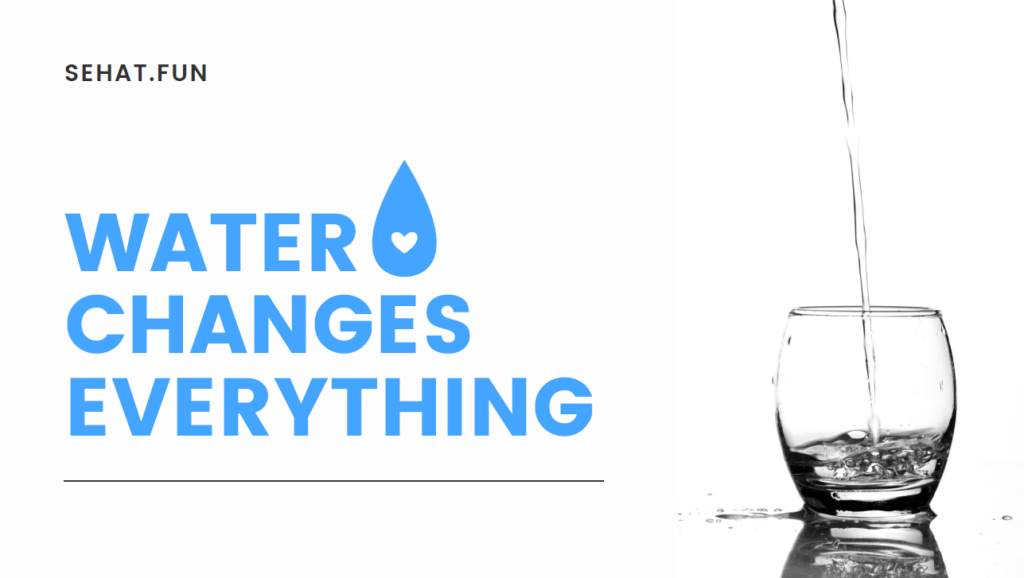Water is the essence of life. Every cell, tissue, and organ in your body depends on it to function properly. Despite its vital role, many people underestimate the significance of drinking water for maintaining a healthy lifestyle. This article explores the importance of staying hydrated, discusses the health benefits of water, and provides practical tips to ensure you meet your daily hydration needs.
1. The Importance of Drinking Water
Water is a cornerstone of overall health and well-being. It constitutes about 60% of the human body and plays a critical role in numerous physiological processes.
- Regulates body temperature: Water helps maintain optimal body temperature through sweating and respiration.
- Supports digestion: Proper hydration aids in breaking down food and absorbing nutrients.
- Flushes out toxins: It helps eliminate waste products through urination, perspiration, and bowel movements.
- Protects tissues and joints: Water cushions your joints and protects sensitive tissues like the eyes and spinal cord.
- Improves cognitive function: Drink water and stay hydrated can enhance focus, memory, and alertness.
2. Health Benefits of Staying Hydrated
Drinking water regularly offers a plethora of health benefits that contribute to long-term well-being.
- Boosts energy levels: Dehydration can lead to fatigue, while adequate water intake keeps your energy levels high.
- Promotes clear skin: Proper hydration helps flush out toxins, reducing the likelihood of acne and dryness.
- Aids in weight management: Drinking water before meals can help control appetite and boost metabolism.
- Enhances kidney function: Sufficient water intake reduces the risk of kidney stones and urinary infections.
- Supports heart health: Hydration can lower blood pressure and reduce the risk of cardiovascular diseases.
3. Practical Tips for Staying Hydrated
Ensuring you drink enough water daily doesn’t have to be a challenge. Incorporate these practical strategies into your routine:
- Set a reminder: Use alarms or hydration apps to remind you to drink water throughout the day.
- Carry a reusable bottle: Keeping a water bottle handy ensures you can drink water wherever you are.
- Infuse flavor: Add slices of fruits like lemon, cucumber, or mint to your water for a refreshing twist.
- Monitor your intake: Aim for at least 8 glasses of water daily, but adjust based on your activity level and climate.
- Hydrate with meals: Drink a glass of water with every meal and snack to make hydration part of your routine.
4. How Dehydration Affects the Body
Dehydration occurs when your body loses more fluids than it consumes, leading to various physical and mental challenges.
- Causes fatigue: Low water levels can decrease energy, making you feel sluggish.
- Impairs mental clarity: Dehydration can lead to confusion, poor concentration, and headaches.
- Strains organs: Prolonged dehydration can overwork kidneys and the cardiovascular system.
- Weakens immunity: Dehydration may reduce the body’s ability to fight off infections.
- Triggers cravings: Dehydration is often mistaken for hunger, potentially leading to overeating.
5. Signs You’re Not Drinking Enough Water
Recognizing the signs of dehydration can help you act quickly to restore hydration.
- Dry mouth and lips: A common early sign of insufficient water intake.
- Dark urine: Dark yellow or amber-colored urine often indicates dehydration.
- Thirst: Feeling thirsty is your body’s way of signaling a need for water.
- Dizziness or lightheadedness: A lack of water affects blood pressure and balance.
- Dry skin: Dehydration can lead to less elastic, dull-looking skin.
6. Special Considerations for Staying Hydrated
Certain groups and conditions require extra attention to hydration needs.
- Athletes: High-intensity exercise demands increased water intake to replace lost fluids.
- Pregnant and breastfeeding women: Additional fluids are necessary for fetal development and milk production.
- Elderly individuals: The sense of thirst diminishes with age, making intentional hydration essential.
- Hot climates: Heat increases fluid loss through sweat, necessitating more frequent water consumption.
- Illness or fever: Drinking water helps manage symptoms and speed up recovery.
7. Drinking Water for Optimal Brain Health
Water is critical for maintaining optimal brain function.
- Improves memory: Proper hydration supports better recall and cognitive processing.
- Reduces mental fatigue: Staying hydrated enhances mental clarity and focus.
- Prevents headaches: Many headaches stem from dehydration and can be alleviated by drinking water.
- Boosts mood: Studies show that even mild dehydration can impact mood and increase irritability.
- Enhances decision-making: Hydration promotes quicker and more accurate problem-solving.
8. Environmental Benefits of Drinking Water
Choosing water as your primary beverage also has environmental benefits.
- Reduces plastic waste: Opting for reusable water bottles reduces single-use plastic consumption.
- Lowers energy use: Producing bottled beverages requires significant energy; tap water is more eco-friendly.
- Minimizes pollution: Drinking water directly from the tap or filtered sources avoids the environmental toll of packaging.
- Encourages sustainable habits: Incorporating water into daily routines fosters mindful consumption practices.
- Supports local ecosystems: Avoiding unnecessary bottled water helps protect local water supplies.
9. Myths About Hydration Debunked
There are several misconceptions about hydration that can lead to confusion.
- Myth: You need exactly 8 glasses a day. Truth: Hydration needs vary based on age, weight, activity level, and climate.
- Myth: Coffee and tea dehydrate you. Truth: Moderate caffeine consumption does not cause significant dehydration.
- Myth: Clear urine means perfect hydration. Truth: Light yellow urine is a better indicator of adequate hydration.
- Myth: You can drink too much water. Truth: Overhydration is rare but possible, usually in extreme cases like endurance sports.
- Myth: Only water counts for hydration. Truth: Other fluids and water-rich foods like fruits and vegetables contribute as well.
Conclusion
Drinking water is a simple yet powerful way to maintain a healthy lifestyle. By staying adequately hydrated, you support your body’s vital functions, enhance your overall well-being, and protect yourself from various health issues. Prioritize drinking water daily, and you will pave the way to a healthier, more energetic you.
